《英国经典散文赏析》教学资源(参考论文)The huge protests in Hong Kong were planned long in advance
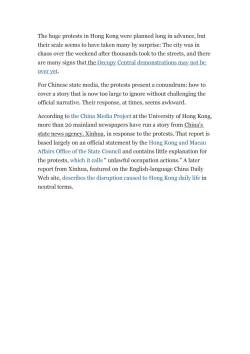
The huge protests in Hong Kong were planned long in advance,but their scale seems to have taken many by surprise:The city was in chaos over the weekend after thousands took to the streets,and there are many signs that the Occupy Central demonstrations may not be over yet. For Chinese state media,the protests present a conundrum:how to cover a story that is now too large to ignore without challenging the official narrative.Their response,at times,seems awkward. According to the China Media Project at the University of Hong Kong, more than 20 mainland newspapers have run a story from China's state news agency,Xinhua,in response to the protests.That report is based largely on an official statement by the Hong Kong and Macau Affairs Office of the State Council and contains little explanation for the protests,which it calls"unlawful occupation actions."A later report from Xinhua,featured on the English-language China Daily Web site,describes the disruption caused to Hong Kong daily life in neutral terms
The huge protests in Hong Kong were planned long in advance, but their scale seems to have taken many by surprise: The city was in chaos over the weekend after thousands took to the streets, and there are many signs that the Occupy Central demonstrations may not be over yet. For Chinese state media, the protests present a conundrum: how to cover a story that is now too large to ignore without challenging the official narrative. Their response, at times, seems awkward. According to the China Media Project at the University of Hong Kong, more than 20 mainland newspapers have run a story from China's state news agency, Xinhua, in response to the protests. That report is based largely on an official statement by the Hong Kong and Macau Affairs Office of the State Council and contains little explanation for the protests, which it calls " unlawful occupation actions." A later report from Xinhua, featured on the English-language China Daily Web site, describes the disruption caused to Hong Kong daily life in neutral terms
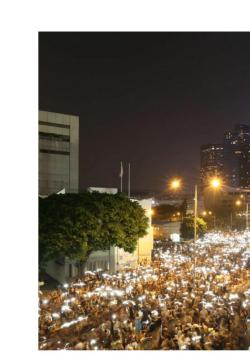
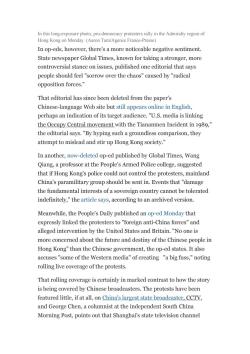
In this long-exposure photo,pro-democracy protesters rally in the Admiralty region of Hong Kong on Monday.(Aaron Tam/Agence France-Presse) In op-eds,however,there's a more noticeable negative sentiment. State newspaper Global Times,known for taking a stronger,more controversial stance on issues,published one editorial that says people should feel"sorrow over the chaos"caused by"radical opposition forces." That editorial has since been deleted from the paper's Chinese-language Web site but still appears online in English, perhaps an indication of its target audience."U.S.media is linking the Occupy Central movement with the Tiananmen Incident in 1989," the editorial says."By hyping such a groundless comparison,they attempt to mislead and stir up Hong Kong society." In another,now-deleted op-ed published by Global Times,Wang Qiang,a professor at the People's Armed Police college,suggested that if Hong Kong's police could not control the protesters,mainland China's paramilitary group should be sent in.Events that "damage the fundamental interests of a sovereign country cannot be tolerated indefinitely,"the article says,according to an archived version. Meanwhile,the People's Daily published an op-ed Monday that expressly linked the protesters to "foreign anti-China forces"and alleged intervention by the United States and Britain."No one is more concerned about the future and destiny of the Chinese people in Hong Kong"than the Chinese government,the op-ed states.It also accuses "some of the Western media"of creating "a big fuss,"noting rolling live coverage of the protests. That rolling coverage is certainly in marked contrast to how the story is being covered by Chinese broadcasters.The protests have been featured little,if at all,on China's largest state broadcaster,CCTV, and George Chen,a columnist at the independent South China Morning Post,points out that Shanghai's state television channel
In this long-exposure photo, pro-democracy protesters rally in the Admiralty region of Hong Kong on Monday. (Aaron Tam/Agence France-Presse) In op-eds, however, there's a more noticeable negative sentiment. State newspaper Global Times, known for taking a stronger, more controversial stance on issues, published one editorial that says people should feel "sorrow over the chaos" caused by "radical opposition forces." That editorial has since been deleted from the paper's Chinese-language Web site but still appears online in English, perhaps an indication of its target audience. "U.S. media is linking the Occupy Central movement with the Tiananmen Incident in 1989," the editorial says. "By hyping such a groundless comparison, they attempt to mislead and stir up Hong Kong society." In another, now-deleted op-ed published by Global Times, Wang Qiang, a professor at the People’s Armed Police college, suggested that if Hong Kong's police could not control the protesters, mainland China's paramilitary group should be sent in. Events that "damage the fundamental interests of a sovereign country cannot be tolerated indefinitely," the article says, according to an archived version. Meanwhile, the People's Daily published an op-ed Monday that expressly linked the protesters to "foreign anti-China forces" and alleged intervention by the United States and Britain. "No one is more concerned about the future and destiny of the Chinese people in Hong Kong" than the Chinese government, the op-ed states. It also accuses "some of the Western media" of creating "a big fuss," noting rolling live coverage of the protests. That rolling coverage is certainly in marked contrast to how the story is being covered by Chinese broadcasters. The protests have been featured little, if at all, on China's largest state broadcaster, CCTV, and George Chen, a columnist at the independent South China Morning Post, points out that Shanghai's state television channel
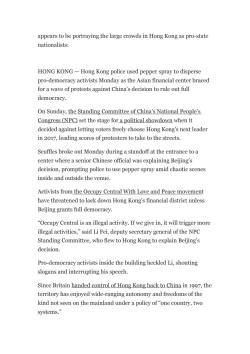
appears to be portraying the large crowds in Hong Kong as pro-state nationalists: HONG KONG-Hong Kong police used pepper spray to disperse pro-democracy activists Monday as the Asian financial center braced for a wave of protests against China's decision to rule out full democracy. On Sunday,the Standing Committee of China's National People's Congress (NPC)set the stage for a political showdown when it decided against letting voters freely choose Hong Kong's next leader in 2017,leading scores of protesters to take to the streets. Scuffles broke out Monday during a standoff at the entrance to a center where a senior Chinese official was explaining Beijing's decision,prompting police to use pepper spray amid chaotic scenes inside and outside the venue. Activists from the Occupy Central With Love and Peace movement have threatened to lock down Hong Kong's financial district unless Beijing grants full democracy. "Occupy Central is an illegal activity.If we give in,it will trigger more illegal activities,"said Li Fei,deputy secretary general of the NPC Standing Committee,who flew to Hong Kong to explain Beijing's decision Pro-democracy activists inside the building heckled Li,shouting slogans and interrupting his speech. Since Britain handed control of Hong Kong back to China in 1997,the territory has enjoyed wide-ranging autonomy and freedoms of the kind not seen on the mainland under a policy of"one country,two systems
appears to be portraying the large crowds in Hong Kong as pro-state nationalists: HONG KONG — Hong Kong police used pepper spray to disperse pro-democracy activists Monday as the Asian financial center braced for a wave of protests against China’s decision to rule out full democracy. On Sunday, the Standing Committee of China’s National People’s Congress (NPC) set the stage for a political showdown when it decided against letting voters freely choose Hong Kong’s next leader in 2017, leading scores of protesters to take to the streets. Scuffles broke out Monday during a standoff at the entrance to a center where a senior Chinese official was explaining Beijing’s decision, prompting police to use pepper spray amid chaotic scenes inside and outside the venue. Activists from the Occupy Central With Love and Peace movement have threatened to lock down Hong Kong’s financial district unless Beijing grants full democracy. “Occupy Central is an illegal activity. If we give in, it will trigger more illegal activities,” said Li Fei, deputy secretary general of the NPC Standing Committee, who flew to Hong Kong to explain Beijing’s decision. Pro-democracy activists inside the building heckled Li, shouting slogans and interrupting his speech. Since Britain handed control of Hong Kong back to China in 1997, the territory has enjoyed wide-ranging autonomy and freedoms of the kind not seen on the mainland under a policy of “one country, two systems
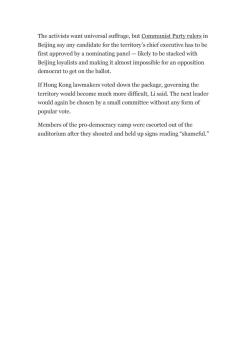
The activists want universal suffrage,but Communist Party rulers in Beijing say any candidate for the territory's chief executive has to be first approved by a nominating panel-likely to be stacked with Beijing loyalists and making it almost impossible for an opposition democrat to get on the ballot. If Hong Kong lawmakers voted down the package,governing the territory would become much more difficult,Li said.The next leader would again be chosen by a small committee without any form of popular vote. Members of the pro-democracy camp were escorted out of the auditorium after they shouted and held up signs reading"shameful
The activists want universal suffrage, but Communist Party rulers in Beijing say any candidate for the territory’s chief executive has to be first approved by a nominating panel — likely to be stacked with Beijing loyalists and making it almost impossible for an opposition democrat to get on the ballot. If Hong Kong lawmakers voted down the package, governing the territory would become much more difficult, Li said. The next leader would again be chosen by a small committee without any form of popular vote. Members of the pro-democracy camp were escorted out of the auditorium after they shouted and held up signs reading “shameful
按次数下载不扣除下载券;
注册用户24小时内重复下载只扣除一次;
顺序:VIP每日次数-->可用次数-->下载券;
- 《英国经典散文赏析》教学资源(参考论文)A Pure Bead of Life(My appreciation of Virginia’s The Death of the Moth).docx
- 上海交通大学:《神话与创意》课程教学资源_教学大纲.docx
- 上海交通大学:《神话与创意》课程教学资源(讲稿)第四讲 神话与生活(阅读与讨论).pdf
- 上海交通大学:《神话与创意》课程教学资源(讲稿)第二讲 神话学理论与方法(文字叙事、图像叙事).pdf
- 上海交通大学:《神话与创意》课程教学资源(讲稿)第二讲 神话学理论与方法(文字叙事、图像叙事).pdf
- 上海交通大学:《神话与创意》课程教学资源(讲稿)第一讲 神话——文化寻根与文学增值 Comparative Mythology.pdf
- 上海交通大学:《神话与创意》课程教学资源_第十四讲 当代影视创意与神话编码(大纲).doc
- 上海交通大学:《神话与创意》课程教学资源_第十二讲 遗产景观与神话重塑(大纲).doc
- 上海交通大学:《神话与创意》课程教学资源_第十三讲 神话原型与品牌效应讲课(大纲).doc
- 上海交通大学:《神话与创意》课程教学资源_符号经济与消费“神话”(大纲).doc
- 《神话与创意》课程教学资源:Journal of Literature and Art Studies(Volume 5, Number 12, December 2015).pdf
- 上海交通大学:《日语视听说》课程PPT教学课件_日语视听说.pptx
- 《日语精读》课程教学资源(企業文化研究)日本企業の新卒採用の特徴および現在の動向.pdf
- 《日语精读》课程教学资源:复合助词「に対して」的误用调查与分析——以中国日语学习者为对象.pdf
- 《日语精读》课程教学资源(同步习题)【総合日本語4】総合日本語T18小練習.pdf
- 《日语精读》课程教学资源(同步习题)【総合日本語4】答え_総合日本語T18答え.pdf
- 《日语精读》课程教学资源(同步习题)【総合日本語4】答え_『総合日語』小練習T12課答え.pdf
- 《日语精读》课程教学资源(同步习题)【総合日本語4】答え_『総合日語』小練習T11課答え.pdf
- 《日语精读》课程教学资源(同步习题)【総合日本語4】答え_『総合日本語』第20課答え.pdf
- 《日语精读》课程教学资源(同步习题)【総合日本語4】答え_『総合日本語』第19課答え.pdf
- 《英国经典散文赏析》教学资源(参考论文)一生为虚一世为粪土(威廉·科贝特《射手》赏析).doc
- 《英国经典散文赏析》教学资源(参考论文)弗朗西斯·培根《谈读书》散文赏析——怡情、博彩、长才.pdf
- 《英国经典散文赏析》教学资源(参考论文)鸟啼——英国诗人劳伦斯作品赏析.docx
- 上海交通大学:《英语文学导论 An Introduction to English Literature》课程教学资源(PPT讲稿)Arthur Miller.pptx
- 上海交通大学:《英语文学导论 An Introduction to English Literature》课程教学资源(PPT讲稿)Drama.pptx
- 上海交通大学:《英语文学导论 An Introduction to English Literature》课程教学资源(PPT讲稿)George Bernard Shaw.pptx
- 上海交通大学:《英语文学导论 An Introduction to English Literature》课程教学资源(PPT讲稿)Jonathan Swift.pptx
- 上海交通大学:《英语文学导论 An Introduction to English Literature》课程教学资源(PPT讲稿)Shakespeare.pptx
- 上海交通大学:《英语文学导论 An Introduction to English Literature》课程教学资源(PPT讲稿)Washington Irving and Virginia Woolf.ppt
- 上海交通大学:《英语文学导论 An Introduction to English Literature》课程教学资源(PPT讲稿)Washington Irving.ppt
- 上海交通大学:《英语文学导论 An Introduction to English Literature》课程教学资源(PPT讲稿)William Wordsworth.pptx
- 上海交通大学:《英语文学导论 An Introduction to English Literature》课程教学资源(PPT讲稿)Wuthering Heights-Final Edition.pptx
- 上海交通大学:《英语文学导论 An Introduction to English Literature》课程教学资源(PPT讲稿)英语文学导论PPT(戏剧)介绍.pptx
- 上海交通大学:《英语文学导论 An Introduction to English Literature》课程教学资源(PPT讲稿)英语文学导论PPT(戏剧)Miller.pptx
- 上海交通大学:《英语文学导论 An Introduction to English Literature》课程教学资源(PPT讲稿)英语文学导论PPT(戏剧)Shakespeare.pptx
- 上海交通大学:《英语文学导论 An Introduction to English Literature》课程教学资源(PPT讲稿)英语文学导论PPT(戏剧)Shaw.pptx
- 上海交通大学:《英语文学导论 An Introduction to English Literature》课程教学资源(阅读资料)Pride and Prejudice.docx
- 上海交通大学:《英语文学导论 An Introduction to English Literature》课程教学资源(阅读资料)Wuthering Heights.docx
- 上海交通大学:《英语文学导论 An Introduction to English Literature》课程教学资源(阅读资料)a modest proposal text.docx
- 上海交通大学:《英语文学导论 An Introduction to English Literature》课程教学资源(阅读资料)Criticism on William Shakespeare and Robert Burns.docx
